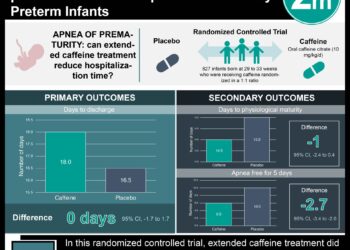Quick Take: Association of socioeconomic status and brain injury with neurodevelopmental outcomes of very preterm children
Preterm birth remains a leading cause of lifelong neurodevelopmental disability. While the effect of brain injury on neurodevelopmental disability has been studied extensively, far less is known with respect to the role of environments and experiences in moderating these associations. In this prospective cohort study, preterm neonates (24-32 weeks’ gestation) born between August 16, 2006 and September 9, 2013 at British Columbia Women’s Hospital in Vancouver, Canada, were followed up and studied to determine the association of brain injury and maternal education with motor and cognitive outcomes at age 4.5 years in very preterm neonates. At 4.5 years of age, a full-scale intelligence quotient (FSIQ) was assessed using the Wechsler Primary and Preschool Scale of Intelligence (fourth edition). Motor outcomes were assessed using the Movement Assessment Battery for Children, second edition (MABC2). Of the 226 survivors comprising the study, neurodevelopmental outcome was assessed in 170 patients. Maternal level of education was available for 197 patients. Researchers found that mean (SD) FSIQ at 4.5 years was 102.0 (14.6). The mean (SD) FSIQ score in children whose mothers had a postgraduate degree (108.30 (9.45)) was significantly higher than the mean (SD) FSIQ scores of both the undergraduate degree group (98.66 (19.65), p=0.01) and the primary or secondary school group (96.24 (19.96), p=0.02). The mean FSIQ scores of the undergraduate and primary or secondary school groups did not differ. With respect to motor outcomes, researchers found that the median M-ABC2 percentile score at age 4.5 years was 37 (IQR 5-63). The median M-ABC2 percentile score was significantly higher in children whose mothers had a postgraduate degree (56.5 (16-91])) than in those in the undergraduate degree group (25 (2-63)) (p =0 .03). When comparing cognitive scores in children with and without brain injury, researchers found that in the absence of brain injury, the higher socioeconomic status (SES) group achieved a predicted FSIQ 7.4 points higher (95% CI 6.99 to 8.83, p<0.001) than the lower SES group. In the presence of brain injury, the association with SES increased, with the higher SES group having a mean increase of 13.7 points (95% CI 13.34 to 14.25, p<0.001) relative to the lower SES group. Based on the best model to assess FSIQ while accounting for gestational age, standardized β coefficients demonstrated the effect size of maternal education (standardized β = 0.21) was similar to that of white matter injury volume (standardized β = 0.23) and intraventricular hemorrhage (standardized β = 0.23). The best-performing model to assess for motor outcome accounting for gestational age included being small for gestational age, severe intraventricular hemorrhage, white matter injury volume, and chronic lung disease. This study therefore shows that at preschool age, the cognitive outcome of preterm neonates was associated with maternal education and neonatal brain injury. The association of brain injury with poorer cognition was attenuated in children born to mothers of higher education level.
Click to read the study in JAMA Network Open
Image: PD
©2019 2 Minute Medicine, Inc. All rights reserved. No works may be reproduced without expressed written consent from 2 Minute Medicine, Inc. Inquire about licensing here. No article should be construed as medical advice and is not intended as such by the authors or by 2 Minute Medicine, Inc.







